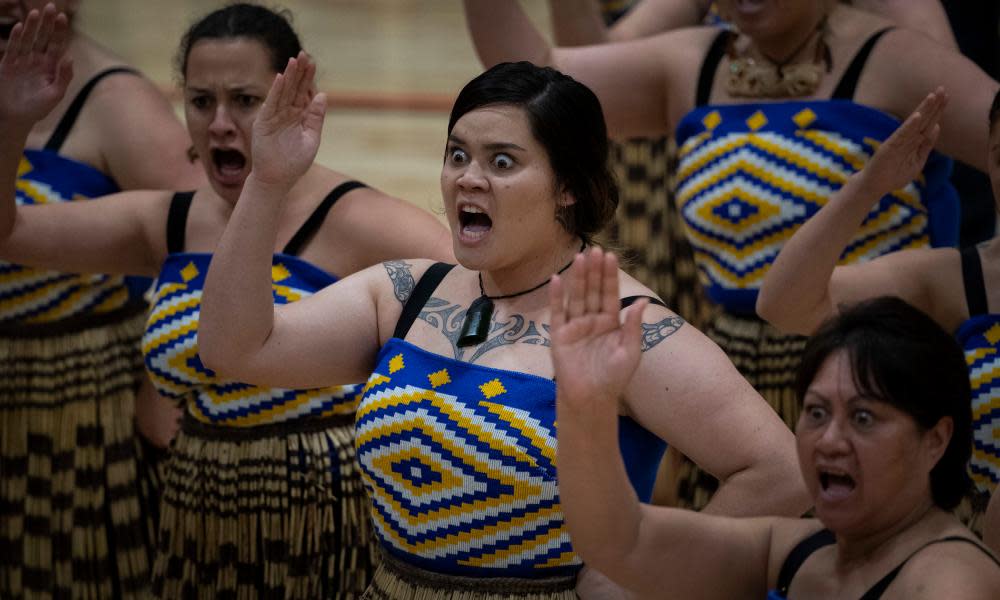The haka isn’t yours – stop performing it

I wonder if any of the French lawyers protesting their government’s pension reform with a haka, the Māori dance form, have ever set foot in New Zealand?
For a good number of white people, including white New Zealanders, haka is apparently irresistible. “Ka Mate”, the Ngāti Toa haka the All Blacks perform pre-match, delights global audiences every year. Contemporary teams take it dead seriously, but in the late-19th and early-20th century the mostly white team would turn to the British crowds, slapping their thighs and hanging their tongues out for “entertainment”.
Related: 'No problem at all': New Zealanders praise England's response to All Blacks haka
The earliest footage is excruciating. It’s a piss-take. But the performance caught on, especially after rugby union went professional in the 1990s. Cable television and mass media took Ka Mate to the world and the world loved it.
In the past three years alone, non-Māori took “haka” as the name of a Canadian energy drink brand, James Cameron has said he is keen on including a “space haka” in his Avatar sequels, and the Rock and Jason Momoa – Polynesians, yes, but non-Māori – sometimes perform haka as a red-carpet party trick.
It’s tempting to write this off as cultural appropriation – taking an indigenous cultural item without permission, usually for a personal or commercial gain. And in one sense it certainly is. But in another sense it seems like an unhelpful idea to reach for.
“Western culture”, if it’s possible to confine something spread across millennia and continents in a two-word term, functions best in the spirit of open exchange, critique, imitation and improvement. But cultural appropriation would charge that a “spirit of cultural exchange” is often just a cover for “theft”.
Descriptively that’s obviously true. Not only did empires take indigenous people’s land and labour, but they often took assimilated parts of their cultures and languages too. Taboo, the English word, is a borrowing from the Polynesia “tapu”. Yet the former strips the later of its original force and meaning, reducing it to the status of a “no-no” rather than the world-ordering term and idea tapu is and was.
This is why I prefer to think about “taking” the haka in Māori terms. The relevant question is: does the performance, whether in New Zealand or France, retain the original haka’s mana and mauri?
The easiest way for a non-Māori person to understand those two terms is to ask: does the performance maintain the haka’s integrity?
In Rotorua, the tourist hotspot in New Zealand’s central North Island, Te Arawa – the local tribe and perhaps the best haka performers in the country – share their art and coach their visitors in certain haka. It’s an exchange western tourists would recognise as constituting a very public good. Those same tourists take the haka they learn home. They perform it as best they remember. This, of course, isn’t cultural appropriation because the haka retain their mana and mauri. Why? Because Te Arawa were in control.
It was up to their tribe’s experts to pick which haka to teach, what history to share and what the instructions for performing were. In a word, the power was still Te Arawa’s. But that isn’t the case with, say, the French lawyers. In their performance the haka is a protest gimmick, a way to jimmy up attention. I appreciate that – at least in the sense haka can take form in a protest. But it isn’t, as some Europeans and North Americans seem to understand it, an act of unrestrained id. It isn’t necessarily just an outlet for anger. To the contrary: the best haka exercise control and consideration in word and motion. It’s a deliberate art like any other, albeit with a force far stronger.
Until Europeans and North Americans can drop that (probably racist) idea that haka is all about releasing anger, one general rule applies: don’t perform a haka you were never given permission to. That’s the best way to preserve its mana and mauri.
Morgan Godfery is a writer and broadcaster. He covers politics and indigenous issues and lives and works in the North Island town of Kawerau.


